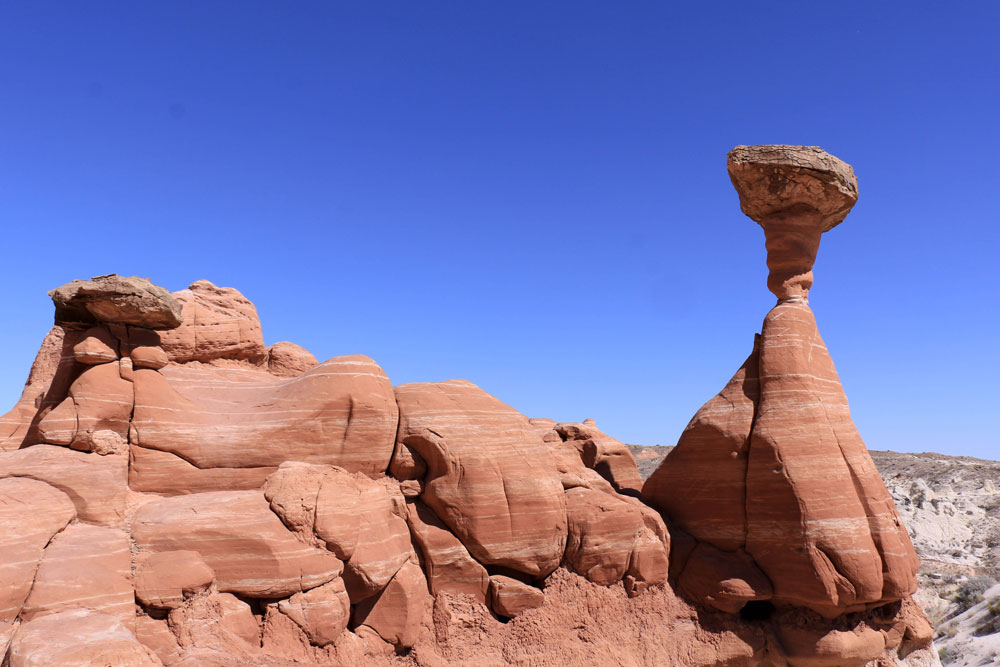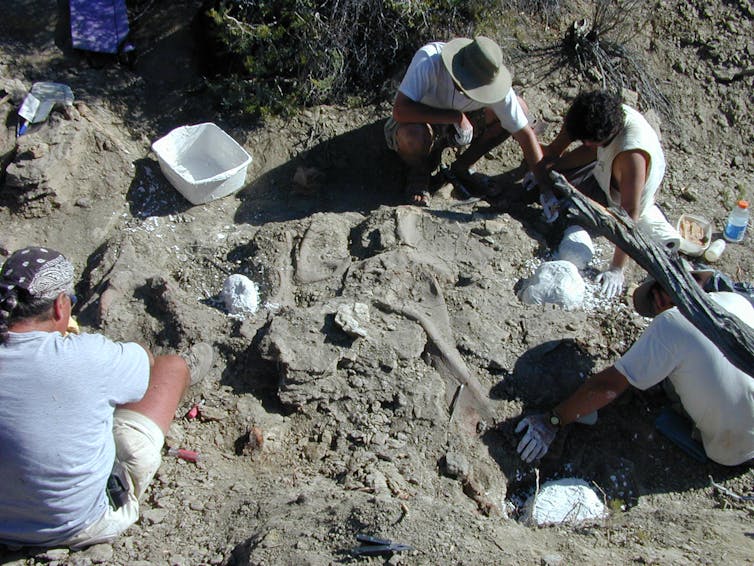
By Jennifer Weeks
On Oct. 7, 2021, the Interior Department announced that President Biden was restoring protection for three U.S. national monuments that the Trump administration sought to shrink drastically: Bears Ears and Grand Staircase-Escalante in Utah, and Northeast Canyons and Seamounts in the Atlantic Ocean. President Trump’s 2017 orders downsizing these monuments, originally created by previous administrations, ignited debate over whether such action was legal. Here are five articles from our archives that examine this controversy.
1. A law rooted in presidential power
Presidents can designate lands as national monuments quickly, without seeking consent from Congress, under the 1906 Antiquities Act. Congress passed the law to protect historically valuable archaeological sites in the Southwest that were being looted.
But as the late John Freemuth, a public policy scholar at Boise State University, observed, presidents soon were using it much more expansively – and affected interests pushed back:
“Use of the Antiquities Act has fueled tensions between the federal government and states over land control – and not just in the Southwest region that the law was originally intended to protect. Communities have opposed creating new monuments for fear of losing revenues from livestock grazing, energy development, or other activities, although such uses have been allowed to continue at many national monuments.”
Freemuth predicted in a 2016 article that “future designations will succeed only if federal agencies consult widely in advance with local communities and politicians to confirm that support exists.”
2. Can presidents alter monuments their predecessors created?
Many environmental advocacy groups and tribes opposed President Trump’s order to remove large swaths of land from these three monuments and sued to block it. The Antiquities Act is silent on this question. But when The Conversation asked environmental lawyers Nicholas Bryner, Eric Biber, Mark Squillace and Sean Hecht, they argued – based on other environmental statutes and legal opinions – that such acts would require congressional approval:
“Courts have always been deferential to presidents’ use of the law, and no court has ever struck down a monument based on its size or the types of objects it is designed to protect. Congress, rather than the president, has the authority to alter monuments, should it decide that changes are appropriate.”
3. Monuments have scenic, cultural and scientific value
National monuments protect many unique resources. For example, Bears Ears conserves land where Indigenous people have lived, hunted and worshiped for centuries. The Bears Ears designation was requested by an intertribal coalition and approved by President Barack Obama after extensive consultation with tribal governments.
Many national monuments contain scenic lands and areas that are critical habitat for endangered species, such as desert tortoises and California condors. The underwater canyons of Northeast Canyons and Seamounts house sponges, corals, squid, octopus, numerous fish species and endangered sperm whales.
Monuments also can have important scientific value. President Bill Clinton designated Grand Staircase-Escalante partly to protect thousands of unique fossil sites, most of which had yet to be studied. Many were located in areas near potential shale gas, coal or uranium extraction zones.
“Decades of ongoing research in this region have literally rewritten what scientists know about Mesozoic life, especially about the ecosystems that immediately preceded the final extinction of the dinosaurs,” Indiana University earth scientist P. David Polly writes. “Paleontologists like me know that the still-pristine Grand Staircase-Escalante region has divulged only a fragment of its paleontological story.”
Read more:
Shrinking the Grand Staircase-Escalante National Monument is a disaster for paleontology

Utah Museum of Natural History, CC BY-ND
4. How a Native American Interior Secretary sees it
The stark difference between the Trump and Biden administrations’ public land policies can be summed up by comparing their respective interior secretaries.
President Trump chose U.S. Rep. Ryan Zinke of Montana to head the agency, which manages more than 480 million acres of public lands, including national monuments. Zinke, who supported opening public lands for oil and gas development and mining, led a review that proposed shrinking the three monuments Biden has just restored.
President Biden’s interior secretary, former U.S. Rep. Deb Haaland of New Mexico, is the first Native American to head the agency that maintains government-to-government relationships with and provides services to Native American Indian tribes and Alaska Native entities.
“For Native Americans, seeing people who look like us and are from where we come from in some of the highest elected and appointed offices in the U.S. demonstrates inclusion. Indian Country finally has a seat at the table,” writes Arizona State University Indigenous studies scholar Traci Morris.
5. Monuments aren’t always beloved at first
Some of the most popular U.S. national parks initially were protected as national monuments, then expanded and given national park status by Congress years later. They include Acadia in Maine, Joshua Tree in Southern California, and Arches in Utah.
But a site’s merit may not be obvious at first. As Arizona State University’s Stephen Pyne writes, the first Europeans who explored the Grand Canyon in the 18th and 19th centuries thought it was unremarkable or worse; one called it “altogether valueless.”
Then geologists working for the federal government traversed the canyon, and wrote rapturous accounts that recast it as a marvel – a shift that Pyne calls “an astonishing reversal of perception”:
“The geologic mystery of the canyon is how the south-trending Colorado River made a sudden turn westward to carve its way, cross-grained, through four plateaus. This is also more or less what happened culturally. Intellectuals cut against existing aesthetics to make a place that looked nothing like pastorals or alpine mountains into a compelling spectacle.”
President Theodore Roosevelt agreed. After making multiple visits to the canyon, he designated it as a national monument in 1908.
![]()
Editor’s note: This story is a roundup of articles from The Conversation’s archives.![]() Jennifer Weeks is Senior Environment and Energy Editor at The Conversation. Weeks interviewed Eric Biber, Professor of Law, University of California, Berkeley, John Freemuth, Cecil D. Andrus Endowed Chair for Environment and Public Lands and University Distinguished Professor, Boise State University, Mark Squillace, Professor of Law, University of Colorado Boulder, Nicholas Bryner, Assistant Professor of Law, Louisiana State University, P. David Polly, Professor of Earth and Atmospheric Sciences, Biology and Anthropology, Indiana University, Sean B. Hecht, Professor of Policy and Practice, UCLA School of Law, University of California, Los Angeles, Stephen Pyne, Emeritus Professor of Life Sciences, Arizona State University, and Traci Morris, Executive Director, American Indian Policy Institute, Arizona State University.
Jennifer Weeks is Senior Environment and Energy Editor at The Conversation. Weeks interviewed Eric Biber, Professor of Law, University of California, Berkeley, John Freemuth, Cecil D. Andrus Endowed Chair for Environment and Public Lands and University Distinguished Professor, Boise State University, Mark Squillace, Professor of Law, University of Colorado Boulder, Nicholas Bryner, Assistant Professor of Law, Louisiana State University, P. David Polly, Professor of Earth and Atmospheric Sciences, Biology and Anthropology, Indiana University, Sean B. Hecht, Professor of Policy and Practice, UCLA School of Law, University of California, Los Angeles, Stephen Pyne, Emeritus Professor of Life Sciences, Arizona State University, and Traci Morris, Executive Director, American Indian Policy Institute, Arizona State University.
![]()
![]()





























Vinny says
Why doesn’t our President focus on shutting our southern boarders instead of doing the opposite of Former President Trumps orders? He should be handling all his own mishaps !
Bill C says
It was American demand for drugs that created the smuggling gangs. They already had their routes established so human trafficking was an adjacent opportunity. The money wasted on building the medieval wall should have gone to the real solution- economic aid to El Salvador, Guatemala and Honduras. And hey, America, try putting down the pipe.
Bill C says
… and congratulations Joe Biden for having the vision to preserve our natural heritage and seeing our environment as a wise investment for the future. Enough oil spills, wildfires and floods.
Sherry says
Great News!
Having witnessed, first hand, the actual horrific “raping” of the land, forests, water and air by mining/oil drilling/logging operations, I can say, without hesitation, that we should be extremely careful and thoughtful before “REDUCING” the size of protected areas of our beautiful country. Long gone are the days of small mining/fossil fuel/lumber operations. . . today, monstrous machines rip through fragile desert habitat. meadows, forests and streams leaving destruction that resembles bombed out war zones in their wake. Natural resources are often “strip mined” and “clear cut” in order to gobbled them up as quickly and cheaply as possible. . . creating relatively few jobs. Then they are sold to the highest bidder. . . often in “other” countries. Once those fossils, rare plants, animal habitat, streams, forests, and meadows are destroyed. . . they are lost to us forever!
Just another terrible example of how we are experiencing the “down side of Capitalism”!
Thank you President Biden!
Bill D says
Of all the poor decisions Biden has made on Foreign affairs ( Afghanistan, French/ Australian nuke , debacle, open southern borders flooding our streets with un-docs, devastated supply chain costing all of us hundreds of dollars a month, crippled the workforce by paying people to stay home (I could go on……an on) and all you can do is put up a headline banner
“BIDEN RESTORES…blah blah blah”
You have to be kidding me!!! report the facts. Our country is deteriorating before our eyes. We are an economic disaster …and the chinese are standing in the wings to “help” us out.
Bill C says
Geez, that’s funny. Biden was complying with the agreement that Trump made in Feb. 2020 with the Taliban to withdraw our troops by May 1 2020. On Feb. 2020 Trump called Corona Virus “a hoax”, and the devastating results were due to his stupidity and incompetency. The stock market crashed as a result of Trump’s denial of science. But now, under Biden, it is at record highs. Face it, your hero is a loser.
Bill C says
ps While China was investing in the technologies of the future, and becoming a world leader in solar and battery technology, Trump was pushing “clean coal”.
Jimbo99 says
Empty legislation really. These monuments are out in the middle of nowhere. Trump wasn’t destroying them. This is like leaving the forest alone & unspoiled for any POTUS. Those rocks and desert sand have been around forever. So Biden-Harris get credit for leaving a remote area of the USA alone ? What is Biden going to do to preserve it, use a bulldozer & dump trucks to restore the sand that the winds & rains shifted around ? This nation/world will be better off when Biden-Harris are replaced in 2024. Really, taking credit for the passage of time & evolution of the planet. Sounds like another Biden self-serving credit for just existing. Today I/we let the grass and trees grow another day, the sun rose & set too.
Pogo says
@”…Former President Trumps (sic) orders…”
A majestic phrase — but where is the flash of lightening and crack of thunder? Here?:
Fanfare for the common trumphole
https://www.youtube.com/watch?v=p3G5IXn0K7A
Fanfare for Joe and the rest of us
https://www.youtube.com/watch?v=HKgk6G0lekQ
@On Topic — and because information may be useful:
tr on national monuments
https://www.google.com/search?d&q=tr+on+national+monuments
trump opens parks and monuments to oil and mining
https://www.google.com/search?d&q=trump+opens+parks+and+monuments+to+oil+and+mining
trump rollbacks of environmental protection laws
https://www.google.com/search?d&q=trump+rollbacks+of+environmental+protection+laws
trump guts wildlife and endangered species protection
https://www.google.com/search?d&q=trump+guts+wildlife+and+endangered+species+protection
Vote. Vote as if you and your children’s extinction are on the ballot — they are.